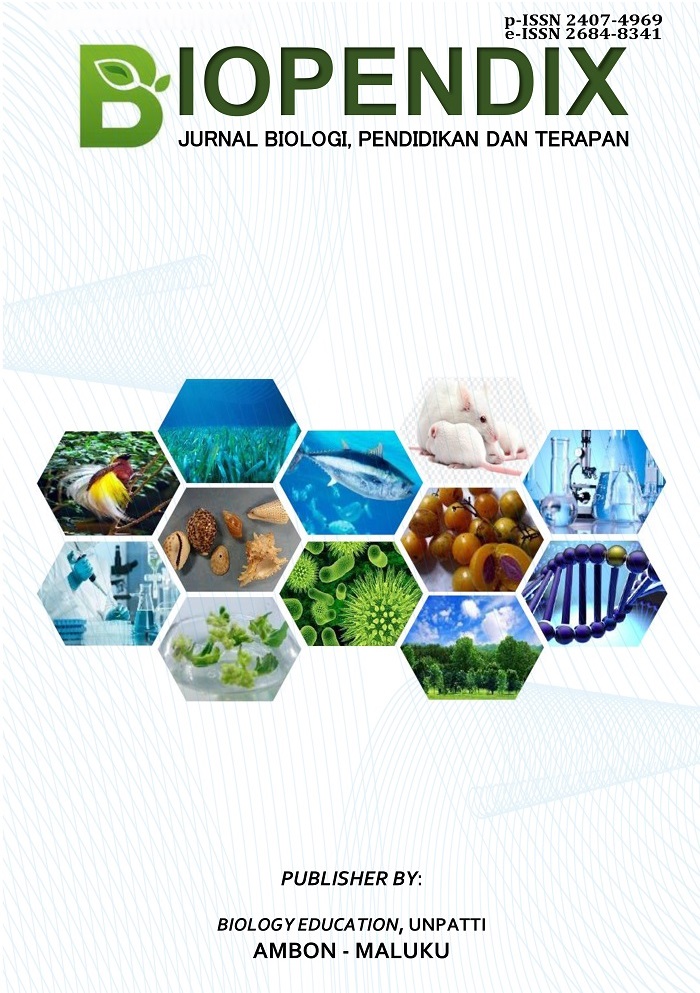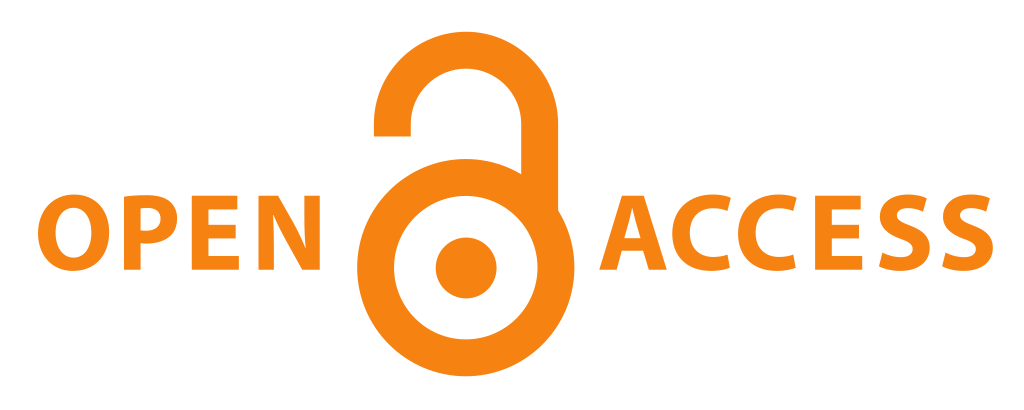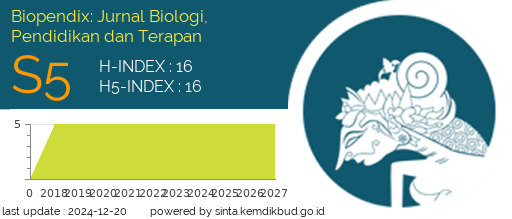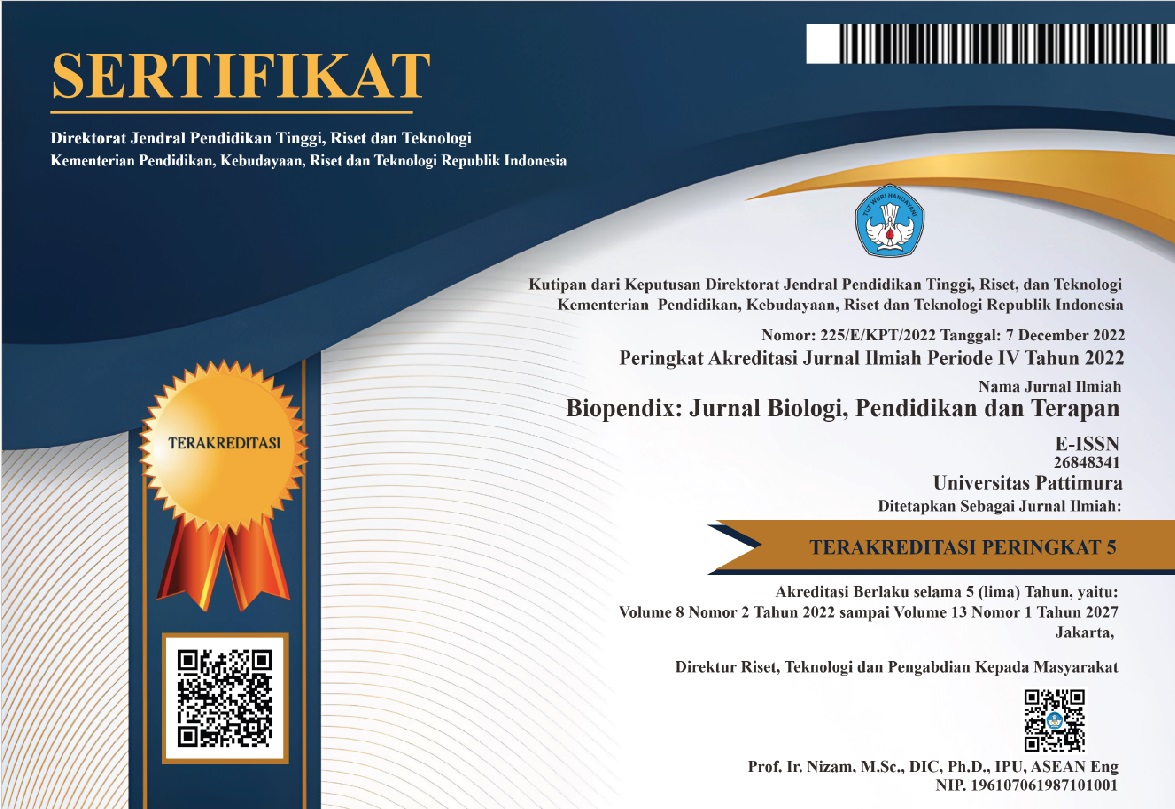A Descriptive Study on the TPACK Knowledge of Biology Teachers in Sragen Regency, Central Java
Abstract
In the context of rapid digital transformation, the integration of the TPACK (Technological Pedagogical Content Knowledge) framework has become increasingly vital for educators—especially those teaching biology—to facilitate the incorporation of technology into instruction and promote deeper student comprehension of complex topics. TPACK comprises three foundational areas: Technological Knowledge (TK), Pedagogical Knowledge (PK), and Content Knowledge (CK), as well as their interrelated domains: Pedagogical Content Knowledge (PCK), Technological Content Knowledge (TCK), and Technological Pedagogical Knowledge (TPK). This study investigates the extent to which high school biology teachers implement the TPACK components. Employing a descriptive research design with a test-based approach, the study targets a hypothetical population encompassing all senior high school biology teachers in Sragen Regency—past, present, and prospective. A convenience sampling technique was applied, selecting 17 currently active biology teachers from 13 senior high schools across the region. Data collection utilized a structured test instrument designed to evaluate teachers’ comprehension of TPACK concepts. Results indicate that the participants generally possess a moderate level of knowledge regarding the application of TPACK in teaching.
Downloads
References
Akhwani, A., & Rahayu, D. W. (2021). Analisis Komponen TPACK Guru SD sebagai Kerangka Kompetensi Guru Profesional di Abad 21. Jurnal Basicedu, 5(4), 1918 - 1925. https://doi.org/10.31004/basicedu.v5i4.1119
Akram, H., Yingxiu, Y., Al-Adwan, A. S., & Alkhalifah, A. (2021). Technology Integration in Higher Education During COVID-19: An Assessment of Online Teaching Competencies Through Technological Pedagogical Content Knowledge Model. Frontiers in Psychology, 12, 736522. https://doi.org/10.3389/fpsyg.2021.736522
Chai, C. S., Koh, J. H. L., & Tsai, C. C. (2013). A review of technological pedagogical content knowledge. Educational Technology and Society, 16(2), 31–51.
Eilks, I., & Markic, S. (2011). Effects of a long-term participatory action research project on science teachers’ professional development. Eurasia Journal of Mathematics, Science and Technology Education, 7(3), 149–160. https://doi.org/10.12973/ejmste/75196
Etkina, E. (2010). Pedagogical content knowledge and preparation of high school physics teachers. Physical Review Special Topics-Physics Education Research, 6(2), 1–26. https://doi.org/10.1103/PhysRevSTPER.6.020110
Gozali, I. (2022). Studentsʼ Perspective on the Importance of EFL Teachersʼ TPACK (Technological Pedagogical Content Knowledge) and XK (Contextual Knowledge) for learning English during the Pandemic. PASAA, 64(1), 244–277. https://doi.org/10.58837/CHULA.PASAA.64.1.11
Hapsari, N., Paidi, Subali, B., Astuti, F. E. C., Pradana, S. P., & Antony, M. K. (2019). The TPACK Profile of Biology Teacher Based on Certification Status: A Case Study in Bantul Regency. Journal of Physics: Conference Series, 1397(1). https://doi.org/10.1088/1742-6596/1397/1/012055
Hayani, S. N., & Sutama, S. (2022). Pengembangan Perangkat dan Model Pembelajaran Berbasis TPACK Terhadap Kualitas Pembelajaran Daring. Jurnal Basicedu, 6(2), 2871–2882. https://doi.org/10.31004/basicedu.v6i2.2512
Joshi, S. (2023). TPACK and Teachers’ Self-Efficacy: A Systematic Review. Canadian Journal of Learning and Technology, 49(2), 1–23. https://doi.org/10.21432/cjlt28280
Koçoǧlu, Z. (2009). Exploring the technological pedagogical content knowledge of pre-service teachers in language education. Procedia - Social and Behavioral Sciences, 1(1), 2734–2737. https://doi.org/10.1016/j.sbspro.2009.01.485
Koehler, M. J., & Mishra, P. (2005). What happens when teachers design educational technology? Journal of Educational Computing Research Environmental Science and Technology, 32(2), 131–152.
Lestari, S. (2015). Analisis Kemampuan Technological Pedagogical Content Knowledge (TPACK) Pada Guru Biologi Sma Dalam Materi Sistem Saraf. Proceeding Biology Education Conference: Biology, Science, Enviromental, and Learning, 12(1), 557–564.
Loi, N. V. (2021). VIETNAMESE HIGH-SCHOOL TEACHERS’ PERCEPTIONS OF TPACK IN TEACHING ENGLISH AS A FOREIGN LANGUAGE. European Journal of Education Studies, 8(4). https://doi.org/10.46827/ejes.v8i4.3693
Mairisiska, T., Sutrisno, & Asrial. (2014). Pengembangan Perangkat Pembelajaran Berbasis TPACK pada Materi Sifat Koligatif Larutan untuk Meningkatkan Keterampilan Berpikir Kritis Siswa Development TPACK Based Learning Devices on Colligative Properties to Improve Critical Thinking Skill Students. Jurnal Pendidikan Matematika Dan Ilmu Pengetahuan Alam, 3(1), 28–37.
M.S.Tuerah, R. (2015). Penguasaan Materi Pembelajaran, Manajemen Dan Komitmen Menjalankan Tugas Berkorelasi Pada Kinerja Guru SD DI KOTA TOMOHON. Jurnal Inovasi Dan Teknologi Pembelajaran, 1(2), 137–154.
Peña-Ayala, A. (2021). A learning design cooperative framework to instill 21st century education. Telematics and Informatics, 62(May). https://doi.org/10.1016/j.tele.2021.101632
Pratama, D. (2021). Profesionalitas Guru Melalui Pendekatan Empat Pilar Pendidikan Dalam Mengembangkan Nilai - Nilai Karakter Siswa. Jurnal Paris Langkis, 1(2), 126 - 139. https://doi.org/10.37304/paris.v1i2.2482
Priscilla, C., & Yudhyarta, D. Y. (2021). Implementasi Pilar-Pilar Pendidikan UNESCO. Asatiza: Jurnal Pendidikan, 2(1), 64–76. https://doi.org/10.46963/asatiza.v2i1.258
Purwaningsih, E. (2015). Potret Representasi Pedagogical Content Knowledge (PCK) Guru dalam Mengajarkan Materi Getaran dan Gelombang pada Siswa Smp. Indonesian Journal of Applied Physics, 5(01), 9. https://doi.org/10.13057/ijap.v5i01.252
Puspitarini, E. W., Sunaryo, S., & Suryani, E. (2013). Pemodelan Technological Pedagogical Content Knowledge ( TPACK ) Berbasis Teknologi Informasi Dan Komunikasi ( TIK ) Dengan Pendekatan Structural Equation Modeling ( SEM ). Seminar Nasional Manajemen Teknologi XVIII, 1–8.
Rosnaeni, R. (2021). Karakteristik dan Asesmen Pembelajaran Abad 21. Jurnal Basicedu, 5(5), 4341–4350. https://doi.org/10.31004/basicedu.v5i5.1548
Santos, J. M., & Castro, R. D. R. (2021). Technological Pedagogical content knowledge (TPACK) in action: Application of learning in the classroom by pre-service teachers (PST). Social Sciences & Humanities Open, 3(1), 100110. https://doi.org/10.1016/j.ssaho.2021.100110
Schmid, M., Brianza, E., & Petko, D. (2021). Self-reported technological pedagogical content knowledge (TPACK) of pre-service teachers in relation to digital technology use in lesson plans. Computers in Human Behavior, 115, 106586. https://doi.org/10.1016/j.chb.2020.106586
Schmidt, D. A., Thompson, A. D., Koehler, M. J., & Shin, T. S. (2014). CIE 2014—44th International Conference on Computers and Industrial Engineering and IMSS 2014—9th International Symposium on Intelligent Manufacturing and Service Systems, Joint International Symposium on "The Social Impacts of Developments in Informat. CIE 2014 - 44th International Conference on Computers and Industrial Engineering and IMSS 2014 - 9th International Symposium on Intelligent Manufacturing and Service Systems, Joint International Symposium on "The Social Impacts of Developments in Informat, 42(2), 2531p.
Seufert, S., Guggemos, J., & Sailer, M. (2021). Technology-related knowledge, skills, and attitudes of pre- and in-service teachers: The current situation and emerging trends. Computers in Human Behavior, 115, 106552. https://doi.org/10.1016/j.chb.2020.106552
Widhy, P. H. (2015). Analisis Pedagogical Content Knowledge Guru Ipa Smp Kelas Viii Dalam Implementasi Kurikulum 2013 Analysis of Pedagogical Content Knowledge Junior High School 8Th Grade Science Teacher on Curriculum 2013 Implementation. Jurnal Pendidikan Matematika Dan Sains Tahun III, 1, 72–78
Copyright (c) 2025 Sendy Putra Pradana, Advend Sri Rizki Sianturi, Muhammad Khoirul Antony, Ahmad Naharuddin Ramadhan

This work is licensed under a Creative Commons Attribution-ShareAlike 4.0 International License.
Authors who publish with this Journal agree to the following terms:
- Author retain copyright and grant the journal right of first publication with the work simultaneously licensed under a creative commons attribution license that allow others to share the work within an acknowledgement of the work’s authorship and initial publication of this journal.
- Authors are able to enter into separate, additional contractual arrangement for the non-exclusive distribution of the journal’s published version of the work (e.g. acknowledgement of its initial publication in this journal).
- Authors are permitted and encouraged to post their work online (e.g. in institutional repositories or on their websites) prior to and during the submission process, as it can lead to productive exchanges, as well as earlier and greater citation of published works





 2
2






